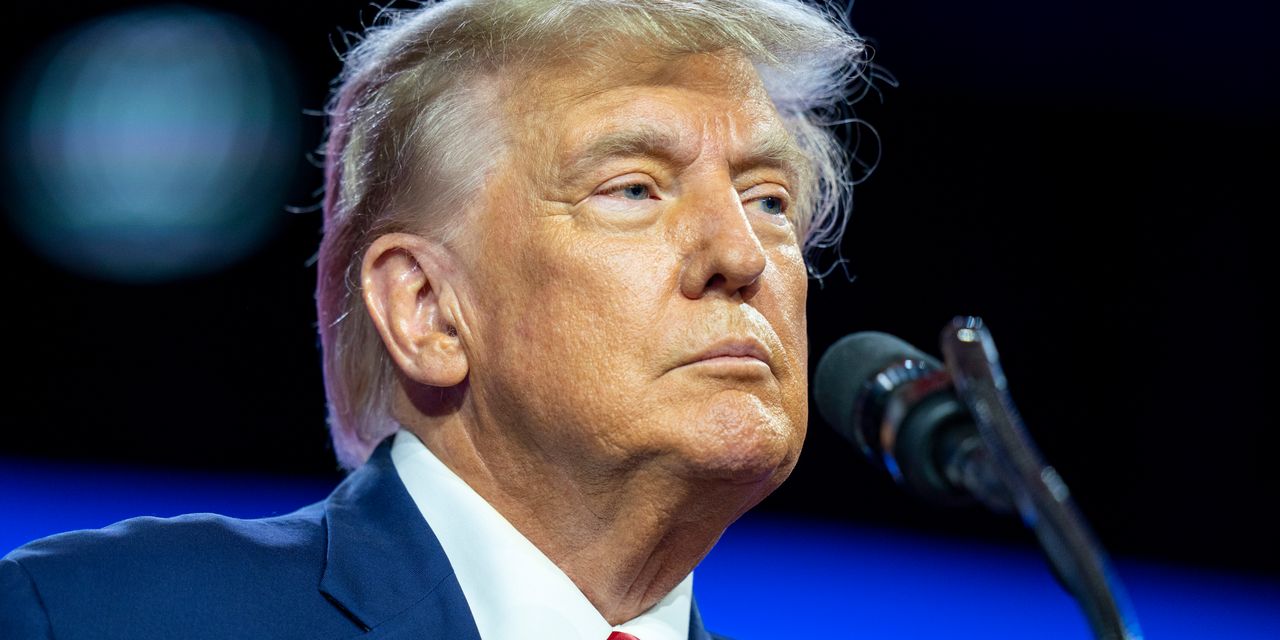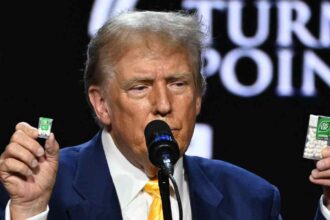Donald Trump was indicted by a Manhattan grand jury Thursday in a case involving hush-money payments to a porn star who said she’d had a sexual encounter with the former president. What will this mean for Trump’s plans to again seek the White House? As Trump presses ahead with his 2024 campaign, here are a few questions and answers about possible criminal charges from the Manhattan district attorney, Democrat Alvin Bragg, and their effects.
Question: Can an indicted person run for president?
Answer: Yes. There’s nothing in the Constitution preventing it. Article II, Section 1, of the Constitution doesn’t mention criminal records. The only requirements to run are being a natural-born citizen at least 35 years old and resident in the U.S. for 14 years.
“ Not only can an indicted person run for president, but a convicted one can, too, legal experts say. ”
Not only can an indicted person run for president, but a convicted one can, too, legal experts say. “There’s nothing in the Constitution disqualifying individuals convicted of crimes from running for or serving as president,” ABC News legal analyst Kate Shaw told the network.
Were Trump to be convicted of a felony, however, he likely could not vote for himself — 48 states ban people with felony convictions from voting, according to advocacy group the Sentencing Project.
From the archives (July 2020): Supreme Court deals setback to Florida felon voting rights
Also see (May 2021): Florida’s DeSantis signs Republican voting bill that Democrats and critics call un-American; bill signing staged as ‘Fox & Friends’ exclusive
Q.: What has Trump said about a possible indictment’s effect on his campaign?
A.: “I wouldn’t even think about leaving,” he told reporters ahead of his speech at this year’s Conservative Political Action Conference. “Probably it will enhance my numbers.” Trump has said he did nothing wrong.
Trump in mid-March said he could be arrested in the coming days, encouraged his supporters to protest and wrote on social media, “TAKE OUR NATION BACK!”
Bragg, in response, told his staff that the office won’t be intimidated or deterred as it nears a decision on charging the former president.
Q.: What have Trump’s rivals for the GOP nomination, or other Republican politicians, said about an indictment?
A.: In a tweet Thursday, Florida Gov. Ron DeSantis, who is expected to announce his bid for the GOP presidential nomination, called the indictment “un-American” and accused the Manhattan D.A. of having a political agenda. DeSantis added that Florida would not cooperate in an extradition request.
House Speaker Kevin McCarthy said “the House of Representatives will hold [Manhattan D.A.] Alvin Bragg and his unprecedented abuse of power to account,” while Rep. Jim Jordan, R-Ohio, who has called for a probe into the Manhattan D.A.’s investigation, tweeted a single word Thursday: “Outrageous.”
Q.: What would a Trump arrest actually look like?
A.: It’s standard for defendants arrested on felony charges to be handcuffed — but it’s unclear whether an exception would be made for Trump due to his status, the New York Times reported. The former president would likely be released on his own recognizance, the Times said, because an indictment likely would contain only nonviolent felony charges. But he would be fingerprinted and photographed.
Q.: Is Bragg’s the only investigation Trump is facing?
A.: No. Besides the Manhattan district attorney’s case, Trump is facing another in Fulton County, Ga., and two federal probes led by special prosecutor Jack Smith. The Georgia probe centers on efforts by Trump and his allies to overturn that state’s 2020 election result. Smith’s investigations concern Trump’s handling of classified material after he left office, and the ex-president’s involvement in the Jan. 6 attack on the U.S. Capitol.
So Trump could be in for more charges depending on the results of those investigations.
Q.: Could something else prevent Trump from being president?
A.: The 14th Amendment bars anyone from public office who, “having previously taken an oath” to support the Constitution, “engaged in insurrection or rebellion” or gave “aid or comfort” to enemies of the U.S. Late last year, a group of 40 House Democrats introduced legislation to bar Trump from holding office, and invoked the 14th Amendment, with Rep. David Cicilline saying the ex-president “very clearly” engaged in an insurrection on Jan. 6, 2021. Trump has denied wrongdoing.
Now read: Who is Alvin Bragg, the Manhattan DA who may be set to bring charges against Donald Trump?
Read more: Fulton County grand jury reported hearing a previously unknown Trump phone call with a top Georgia official
Also see: Here are the Republicans running for president — or seen as potential 2024 candidates
Read the full article here










